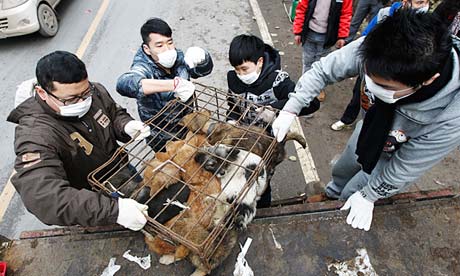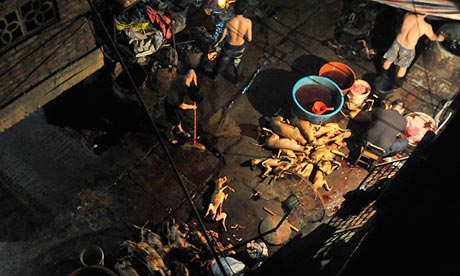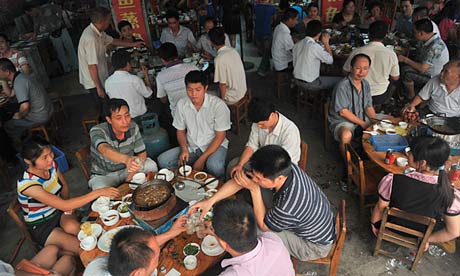Chinese city dogged by criticism over dog-meat festival
People of Yulin, Guangxi province, cherish summer solstice tradition but animal rights groups denounce event as inhumane

Chinese volunteers rescue dogs destined for dog-meat restaurants. In China, dog meat is prized as a nutritious wintertime dish. Photograph: Quirky China News/Rex Features
Residents of a small city in southern China plan to hold an annual dog-meat festival on Friday amid intense criticism from animal rights groups, which have denounced the one-day event as unsafe and inhumane.
Residents of Yulin in Guangxi province consider the festival an ancient summer solstice tradition. Many cherish their city's dog-meat culture, which involves the mass consumption of dog-meat hotpot served with lychees and strong grain liquor.
Animal rights groups say 10,000 dogs are slaughtered during the festival each year, and that many are electrocuted, burned and skinned alive. Pictures posted online show flayed dogs, dogs hanging from meat hooks, and piles of dog corpses on the side of the road. In China dog meat isprized as a nutritious wintertime dish that doctors can prescribe to treat maladies such as impotence and poor circulation.
 Dog meat being prepared for sale in Yulin, Guangxi province. Photograph: Quirky China News/Rex Features
Dog meat being prepared for sale in Yulin, Guangxi province. Photograph: Quirky China News/Rex Features
Activists have tried to block the event on numerous occasions through open letters and street protests. Some have implored the UK and US governments to interfere with the festival via online petitions. "Please help us stop the Yulin Festival of eating dogs in Guangxi province. It is bloody and disregards life," a petition on the US White House website was titled.
"They use knives to kill the dogs which are alive," it said, according to the South China Morning Post. "Then people would like to burn the dogs, which are conscious, so they can eat them." The petition was recently taken down because it failed to meet the 100,000 signature threshold required to elicit a response from the Obama administration.
 Chinese diners tuck into dog-meat hotpot in a restaurant in Yulin, Guangxi province. Photograph: Imaginechina/Rex Features
Chinese diners tuck into dog-meat hotpot in a restaurant in Yulin, Guangxi province. Photograph: Imaginechina/Rex Features
According to an open letter by the Hong Kong-based NGO Animals Asia, many of the dogs consumed during the festival are strays and abductees. Some are transported to the city on filthy, overcrowded trucks, significantly increasing the risk that they carry rabies and other contagious diseases. Yulin officials claim that the dogs are raised by local farmers.
"Stolen dogs without quarantine certificates are cruelly slaughtered and sold to restaurants at very low prices," Master Huici, assistant director of the Hebei Buddhism Charity Foundation, told the state-run Global Times newspaper.
Yulin officials did not pick up the phone on Tuesday afternoon, outside of working hours.
Last month Chinese border officials seized 213 bear paws – an expensive ingredient in traditional Chinese medicine – and arrested two Russian citizens for trying to smuggle them into the country in vehicle tyres.
No comments:
Post a Comment